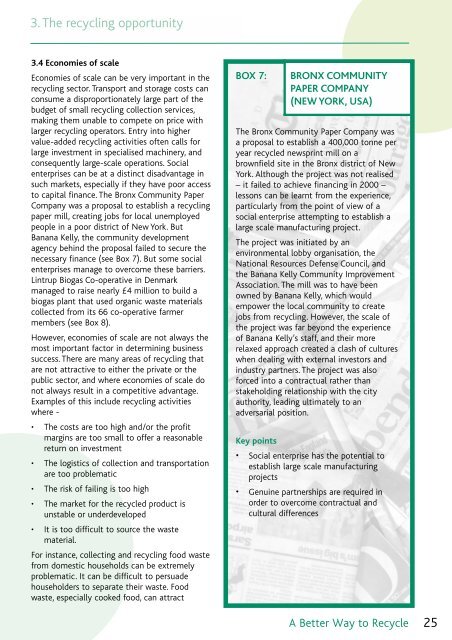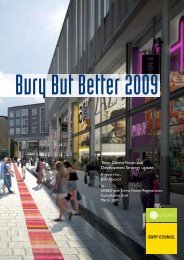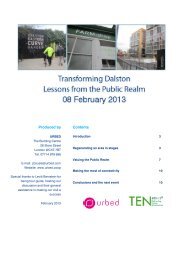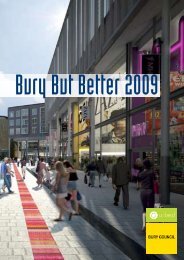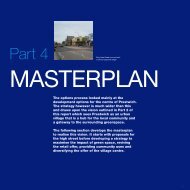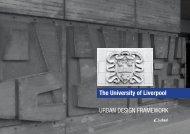A Better Way to Recycle: co-operative and community ... - Urbed
A Better Way to Recycle: co-operative and community ... - Urbed
A Better Way to Recycle: co-operative and community ... - Urbed
Create successful ePaper yourself
Turn your PDF publications into a flip-book with our unique Google optimized e-Paper software.
3. The recycling opportunity3.4 E<strong>co</strong>nomies of scaleE<strong>co</strong>nomies of scale can be very important in therecycling sec<strong>to</strong>r. Transport <strong>and</strong> s<strong>to</strong>rage <strong>co</strong>sts can<strong>co</strong>nsume a disproportionately large part of thebudget of small recycling <strong>co</strong>llection services,making them unable <strong>to</strong> <strong>co</strong>mpete on price withlarger recycling opera<strong>to</strong>rs. Entry in<strong>to</strong> highervalue-added recycling activities often calls forlarge investment in specialised machinery, <strong>and</strong><strong>co</strong>nsequently large-scale operations. Socialenterprises can be at a distinct disadvantage insuch markets, especially if they have poor access<strong>to</strong> capital finance. The Bronx Community PaperCompany was a proposal <strong>to</strong> establish a recyclingpaper mill, creating jobs for local unemployedpeople in a poor district of New York. ButBanana Kelly, the <strong>co</strong>mmunity developmentagency behind the proposal failed <strong>to</strong> secure thenecessary finance (see Box 7). But some socialenterprises manage <strong>to</strong> over<strong>co</strong>me these barriers.Lintrup Biogas Co-<strong>operative</strong> in Denmarkmanaged <strong>to</strong> raise nearly £4 million <strong>to</strong> build abiogas plant that used organic waste materials<strong>co</strong>llected from its 66 <strong>co</strong>-<strong>operative</strong> farmermembers (see Box 8).However, e<strong>co</strong>nomies of scale are not always themost important fac<strong>to</strong>r in determining businesssuccess. There are many areas of recycling thatare not attractive <strong>to</strong> either the private or thepublic sec<strong>to</strong>r, <strong>and</strong> where e<strong>co</strong>nomies of scale donot always result in a <strong>co</strong>mpetitive advantage.Examples of this include recycling activitieswhere -• The <strong>co</strong>sts are <strong>to</strong>o high <strong>and</strong>/or the profitmargins are <strong>to</strong>o small <strong>to</strong> offer a reasonablereturn on investment• The logistics of <strong>co</strong>llection <strong>and</strong> transportationare <strong>to</strong>o problematic• The risk of failing is <strong>to</strong>o high• The market for the recycled product isunstable or underdeveloped• It is <strong>to</strong>o difficult <strong>to</strong> source the wastematerial.For instance, <strong>co</strong>llecting <strong>and</strong> recycling food wastefrom domestic households can be extremelyproblematic. It can be difficult <strong>to</strong> persuadehouseholders <strong>to</strong> separate their waste. Foodwaste, especially <strong>co</strong>oked food, can attractBOX 7:BRONX COMMUNITYPAPER COMPANY(NEW YORK, USA)The Bronx Community Paper Company wasa proposal <strong>to</strong> establish a 400,000 <strong>to</strong>nne peryear recycled newsprint mill on abrownfield site in the Bronx district of NewYork. Although the project was not realised– it failed <strong>to</strong> achieve financing in 2000 –lessons can be learnt from the experience,particularly from the point of view of asocial enterprise attempting <strong>to</strong> establish alarge scale manufacturing project.The project was initiated by anenvironmental lobby organisation, theNational Resources Defense Council, <strong>and</strong>the Banana Kelly Community ImprovementAssociation. The mill was <strong>to</strong> have beenowned by Banana Kelly, which wouldempower the local <strong>co</strong>mmunity <strong>to</strong> createjobs from recycling. However, the scale ofthe project was far beyond the experienceof Banana Kelly’s staff, <strong>and</strong> their morerelaxed approach created a clash of cultureswhen dealing with external inves<strong>to</strong>rs <strong>and</strong>industry partners. The project was alsoforced in<strong>to</strong> a <strong>co</strong>ntractual rather thanstakeholding relationship with the cityauthority, leading ultimately <strong>to</strong> anadversarial position.Key points• Social enterprise has the potential <strong>to</strong>establish large scale manufacturingprojects• Genuine partnerships are required inorder <strong>to</strong> over<strong>co</strong>me <strong>co</strong>ntractual <strong>and</strong>cultural differencesA <strong>Better</strong> <strong>Way</strong> <strong>to</strong> <strong>Recycle</strong> 25


